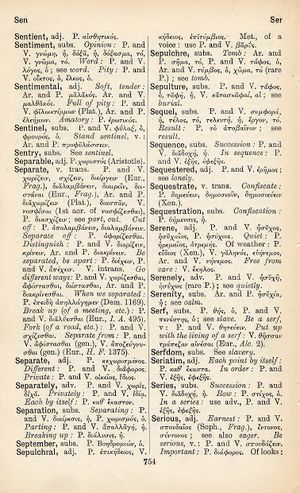separate
Τὸ νικᾶν αὐτὸν αὑτὸν πασῶν νικῶν πρώτη τε καὶ ἀρίστη. Τὸ δὲ ἡττᾶσθαι αὐτὸν ὑφ' ἑαυτοῦ πάντων αἴσχιστόν τε ἅμα καὶ κάκιστον. → Τo conquer yourself is the first and best victory of all, while to be conquered by yourself is of all the most shameful as well as evil
English > Greek (Woodhouse)
verb transitive
P. and V. χωρίζειν, σχίζειν, διείργειν (Eur., Fragment), διαλαμβάνειν, διαιρεῖν, δαστάναι (Eur., Fragment), Ar. and P. διαχωρίζειν (Plato), διασπᾶν, V. νοσφίσαι (1st aor. of νοσφίζεσθαι), P. διασχίζειν; see part, cut.
cut off: P. ἀπολαμβάνειν,διαλαμβάνειν.
distinguish: P. and V. διορίζειν, κρίνειν, Ar. and P. διακρίνειν.
be separated, be apart: P. διέχειν, P. and V. ἀπέχειν.
verb intransitive
go different ways: P. and V. χωρίζεσθαι, ἀφίστασθαι, διίστασθαι, Ar. and P. διακρίνεσθαι.
when we separated: P. ἐπειδὴ ἀπηλλάγημεν (Dem. 1169).
break up (of a meeting, etc.): P. and V. διαλύεσθαι (Eur., Iphigenia in Aulis 495).
fork (of a road, etc.): P. and V. σχίζεσθαι.
separate from: P. and V. ἀφίστασθαι (gen.), V. ἀποζεύγνυσθαι (gen.) (Eur., Hercules Furens 1375).
adjective
different: P. and V. διάφορος.
private: P. and V. οἰκεῖος, ἴδιος.
Latin > English (Lewis & Short)
sēpărātē: adv., v. separo,
I P a. fin.
Latin > French (Gaffiot 2016)
sēpărātē, seult au comp. separatius : Cic. Inv. 2, 156, à part, plus spécialement.
Latin > German (Georges)
sēparātē, Adv. (separatus), doch nur im Compar., besonders, quaedam argumentationes communiter et similiter tractabuntur, quaedam separatius ad finem adiungentur, Cic. de inv. 2, 156.

